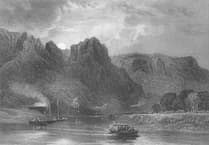CONSERVATIONISTS look set to save Mushet's Whitecliff furnace as part of a £2.8 million scheme to promote the Wye Valley.
A £50,000 heritage lottery grant will kick-start an appeal to save one of the Dean's most important archaeological sites.
A rope access team is assessing the condition of the imposing 30m high furnace near Coleford.
Their findings will shape plans to save the crumbling structure which brought iron man David Mushet to the Forest in 1810 and is considered of national importance.
David's famous son Robert Forester Mushet, pictured, who developed the Bessemer process, was born in Coleford the following year and historians are already preparing to mark the 200th anniversary of his birth in 2011.
Historians say the Dean Heritage Museum Trust has struggled to maintain the furnace which was recently added to the 'high risk' section of the English Heritage National Buildings at Risk register.
Restoration of the furnace was on the reserve list of the £2.8million Overlooking the Wye project until the partnership board decided to move it up the queue and kick start conservation works with a £50,000 grant.
Project officer Kate Biggs says additional funding bids will be submitted to English Heritage and the Forest of Dean Local Action Programme.
"Interpretation at this site will tell people how the Forest and the Wye Valley was at the cutting edge of the industrial revolution in the 19th Century," she said.
"There are many people who have been watching the site deteriorate over the past 20 years despite efforts to raise funds."
The Museum Trust says it is keen to work with the heritage lottery funded scheme to save the first coke fired blast furnace in the Dean.
Historian Averil Kear praised Kate Biggs for fighting to safeguard the furnace for future generations.
"It needs a lot of TLC to bring it back to what it was 20 years ago, but if anybody can do it, Kate can," she said.
Local History Society chairman Ron Beard says the structure is significant because it is the only blast furnace that remains in the Forest as a reminder of the iron industry and is also important because of its links with the Mushet family.
"The furnace was partially restored some years ago but is now at risk of serious deterioration and we therefore strongly support efforts to preserve it as a Forest monument to the iron industry," he said.
The furnace is believed to have closed between 1812 and 1816 because of financial problems. David Mushet later went on to open the Darkhill works with son Robert, which is considered a monument of international importance.




